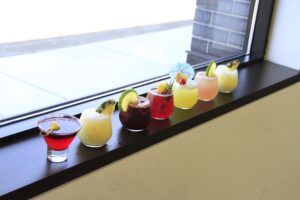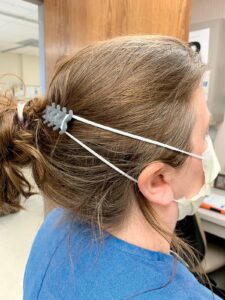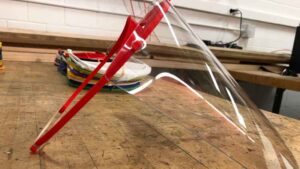
Quarantinis
BY DEBRA KEEFER RAMAGE
What do an instructor from a technical college, a pair of socially conscious small businesses, and a robotics class from a suburban high school have in common? They are all providing creative solutions to the problem of shortages of PPE (personal protective equipment) to healthcare and other “frontline” workers during the COVID-19 pandemic. Instructor Jazmine Darden at Dunwoody College of Technology is using 3D printers to create “ear-savers” for workers who have to wear masks with ear loops. These can become painful after many hours on the job, leading to inflammation or headaches. Ear-savers are a gadget that the ear loops can hook onto, which then goes behind the head without putting pressure on the ears. Irondale (New Brighton) High School students in the Knight-Krawler Robotics team are also using 3D printers, but they’re making the transparent full-face shields that you have (hopefully) only ever seen in movies. They’re using leftover supplies, and buying more with the money they had banked to go to a robotics competition, canceled due to COVID-19. When that runs out, local businesses have pledged funds for more. Also making face shields with 3D printers is a partnership of two very local, very niche businesses who already had an ethos of “giving back.” One is Woodchuck USA, which makes custom wood products, and then plants a tree for every order sold. The other is Kind Lips; they make lip balm, donating 20% of the proceeds to anti-bullying campaigns. It seems everyone, from private individuals, to small clubs and social groups, to unexpected partners like these, is getting in on the PPE, face mask and hand sanitizer shortage project.

Example of ear savers
We’re looking at how a crisis like a global pandemic can call forth amazing resilience and creativity from so many. Sometimes, as in the examples above, it’s how someone with extra time on their hands solves a problem or organizes a teamwork contribution to fighting the pandemic. Sometimes it’s how a small business comes up with a new delivery model on the spot to keep from going under. Sometimes it’s how a nonprofit or service provider, an artist or a performer, finds a new way to do their work when social distancing cuts off the old way. And sometimes it’s just a matter of how the disruption and the loneliness of isolation have caused many new communities to form, using new ways of connecting. On that subject, some of my comrades and I have been discussing pods. This is a way of organizing people that has roots in both mutual aid networks, which are all the rage now; even AARP is mapping mutual aid networks (aarpcommunityconnections.org/find-group/) as well as restorative justice. In fact, if you access the AARP link, one of the local links you’ll get to is called simply Twin Cities Mutual Aid (https://tinyurl.com/r27har4 ) and it’s all about pods, including existing neighborhood pods in the Twin Cities, and how to form your own, and how to do a resource inventory called “pod mapping.”
While sectors of the health care industry associated with acute care, emergency medicine, respiratory health and other sectors in the front lines of the COVID-19 fight are working overtime, other sectors of health care are forced to idle. General medical clinics, dentists, chiropractors, physical therapists and many others cannot practice, or only respond to emergency cases. Some have also created new telehealth programs, and you can get diagnosed via video, or your PT can send you an exercise routine online. Another area that normally relies on face-to-face or group settings is mental health. The walk-in counseling center is still open, but not to walk-ins; you have to call and set up a Zoom counseling session. A friend of mine is a young, newly-qualified psychotherapist who is also interested in mindfulness as a therapeutic practice for himself. He has started a small group Zoom-based daily meditation practice modeled on Suzuki’s Zen Mind, Beginner’s Mind. This has been a real lifesaver for me, and I tune in every day (almost) for a dose of Zen.
A related area is that of exercise classes in gyms and studios and dojos. There seem to be hardly any that have just shuttered. Most are using YouTube, Facebook Live, or Zoom to deliver routines to those at home. Some rely on pay-if-or-what-you-can donations and are open to everyone, while some have membership portals to go through. An

Face shield
innovative dojo/studio in St. Paul, Grappler Station, is an example of the former. You can access their online programs and see what they’re doing via Facebook at facebook.com/grapplerstation/. Even though they normally rely on membership fees to exist, the YWCA simply put a nice selection of exercise class videos, from HIT and “Chisel” to chair yoga and gentle stretching, on their site open to everyone. Check out ywcampls.org/fitness-membership/group-fitness/ywca-on-demand/. Even Nokomis Healthy Seniors has an exercise video (tinyurl.com/ybjhguwx) in the form of a long video loaded into a Google doc. Mpls.St.Paul Magazine did a long article that lists scores of Twin Cities gyms and studios offering virtual exercise; see it here: mspmag.com/health-and-fitness/the-gym-is-closed-now-what/.
Nonprofits too often rely on personal closeness or social gathering to do their missions. Some nonprofits are linked with a traditional business model, be it a cafe or a theater or something else. The popular Café Meow in Uptown is actually an animal rescue organization. During COVID, their cafe is closed, but they still foster cats and place them for adoption, and you can “meet” their foster cats via video. Check out their Facebook page for details. Local puppet theater Z Puppets had a major show opening, “Through the Narrows,” collide with coronavirus, so they put it online for over a month and it was a great success. In the Heart of the Beast, which was already going through major “creative disruption,” recently offered a series of online art workshops called Chrysalis May Day, with artists Graci Horne, Ifrah Mansour and Mike Hoyt, each teaching unique skills of puppet craft the last weeks of April. See hobt.org for more.
For traditional small businesses, sometimes they turn to paying it forward while struggling to stay in business. Hot Hands Pies and Biscuits in St. Paul is doing a good take-out business in their bakery, but have added an option to buy a gift card for a stranger to their menu. See their Facebook page for more. And some businesses just want (you) to have fun. Flying Dutchman Spirits of Eden Prairie is making waves with their innovative Quarantini kits. See what that’s about at https://www.flyingdutchmanspirits.com/.






















